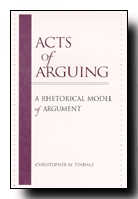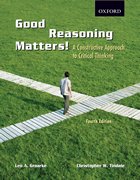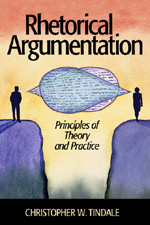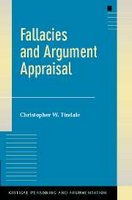|
University
|
Dept.
of Philosophy Christopher Tindale |
|
|
Books The revival of argumentation theory in the past few decades has focused on its logical and dialectical dimensions, with less attention paid to rhetorical features. This book explores and then redresses this imbalance. It examines important logical and dialectical innovations in recent argumentation theory and shows that they depend implicitly upon rhetorical features of argument that have been suppressed in the account. This is illustrated using two extended case studies, one looking at Shell International's defense of its actions in Nigeria after the death of Ken Saro-Wiwa, and the other exploring the uses of character-based argument and testimony in a Holocaust-denial text and legal trial.
|
Click on cover to go to publisher's website |
|
|
New technology has revolutionized the way most of us receive and process information. We are inundated with messages conveyed by everything from radio, television, and the Internet to billboards and bumper stickers. Designed to develop the skills students need to respond effectively to those messages -- verbal and non-verbal alike -- Good Reasoning Matters! offers a unique approach to critical thinking that emphasizes not just how to evaluate arguments but how to construct them. |
Click on cover to go to publisher's website |
|
|
The study of argumentation has primarily focused on logical and dialectical approaches, with minimal attention given to the rhetorical facets of argument. Rhetorical Argumentation: Principles of Theory and Practice approaches argumentation from a rhetorical point of view and demonstrates how logical and dialectical considerations depend on the rhetorical features of the argumentative situation. Throughout this text, I identify how argumentation as a communicative practice can best be understood by its rhetorical features.
|
Click on cover to go to publisher's website |
|
|
Fallacies and Argument Appraisal presents an introduction to the nature, identification, and causes of fallacious reasoning, along with key questions for evaluation. Drawing from the latest work on fallacies as well as some of the standard ideas that have remained relevant since Aristotle, the book investigates central cases of major fallacies in order to understand what has gone wrong and how this has occurred. Dispensing with the approach that simply assigns labels and brief descriptions of fallacies, I provide fuller treatments that recognize the dialectical and rhetorical contexts in which fallacies arise. This volume analyzes major fallacies through accessible, everyday examples. Critical questions are developed for each fallacy to help the student identify them and provide considered evaluations. |
Click on cover to go to publisher's website |
|



